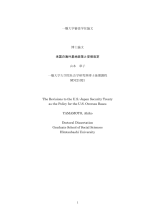4 0 0 0 OA 極東米軍再編と海兵隊の沖縄移転
- 著者
- 山本 章子
- 出版者
- 国際安全保障学会
- 雑誌
- 国際安全保障 (ISSN:13467573)
- 巻号頁・発行日
- vol.43, no.2, pp.76-90, 2015-09-30 (Released:2022-04-01)
3 0 0 0 OA 米国の海外基地政策としての安保改定 ―ナッシュ・レポートをめぐる米国政府内の検討―
- 著者
- 山本 章子
- 出版者
- 一般財団法人 日本国際政治学会
- 雑誌
- 国際政治 (ISSN:04542215)
- 巻号頁・発行日
- vol.2015, no.182, pp.182_111-182_124, 2015-11-05 (Released:2016-08-04)
- 参考文献数
- 56
This article aims at reconsidering the decision making process of the Eisenhower administration on the revisions to the U.S.-Japan Security Treaty in 1960 as part of the policy for the U.S. oversea bases. The previous studies have argued the treaty revisions as part of American policy toward Japan with a motive to prevent her from neutralization. But so-called “New Look”, the cold war strategy of the Eisenhower’s administration which depended on nuclear weapon capability, built in the presence of oversea bases all over the world. Therefore, the U.S. government addressed lessening the complaint of the host nations to maintain the oversea bases. This article discusses the treaty revisions from the point of its relations with the Nash Report, the survey and recommendation on the situation and issues surrounding U.S. oversea bases, to point out how the treaty revisions have a close link with the comprehensive U.S. oversea-bases policy. Furthermore, my analysis focuses on the attitude of the U.S. military including the Pentagon. The previous studies have ignored the role of the U.S. military in terms of the treaty revisions, but they are a key actor as well as the Department of State and the American embassy in Japan because the U.S. military has a veto of security policies.During the period of the Eisenhower’s administration, the USSR’s success in hydrogen-bomb test and appeal for change for peace after death of Stalin escalated fear of entrapment and demand of reducing U.S.-Soviet tension among the U.S. allies. In addition, the success of the USSR in development of ICBM missiles and Sputnik I launching in 1957, persuaded the host nations to limit their alliance commitment to the United States. Furthermore, the presence of U.S. military forces for a long time and criminal jurisdiction procedures involving U.S. military personnel unfair to the host nations also led to public protest against the security policy of their government. As for Japan in 1950s, the presence of U.S. military bases was considered as an ongoing symbol of the “U.S. occupation”. What is more, the strong anti-nuclear sentiment everywhere in Japan strengthened the public’s fear of entrapment. The neutralists in Japan succeeded in propagating the idea that the U.S. military presence would increase the risk of entrapping Japan into unwanted nuclear wars after so-called “Sputnik shock”.Reflecting such a situation, the Nash Report recommended that the U.S. should examine alternatives to their base system in Far East. This recommendation became discussed seriously by the Operation Coordinating Board in spite of the opposition by the U.S. military. These altered the negative attitude of the U.S. military toward the treaty revisions.

